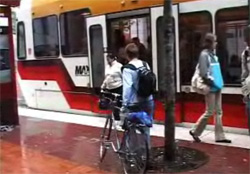The Manifold Value of Walkable Places
 The ease of getting around Portland without a car enriches the city.
The ease of getting around Portland without a car enriches the city.As Elana Schor wrote here a few weeks ago, transportation reform is health reform. The connection between active transportation and public health took center stage at PA Walks and Bikes this week, where Michele Barrett shared some startling statistics on the huge toll obesity takes in Pennsylvania:
In a period of time when health care is so heatedly debated, I can’t help but wonder what first steps we can take towards solving the crisis ourselves. What might be the least costly, most effective means to reduce the cost of health care? Can it really be as simple as taking a 30 minute walk every day? [Quoting a paper by Eric A. Finklestein et. all:] ‘For the United States as a whole, obesity-attributable medical expenditures are estimated at $75 billion, with $17 billion financed by Medicare and $21 billion financed by Medicaid. State-level estimates range from $87 million (Wyoming) to $7.7 billion (California).’ Pennsylvania holds second place for the highest obesity-attributable medical expenditures — $4.138 Billion annually.
After returning from the Safe Routes to School National Conference in Portland, Oregon a few days ago, Michele shared another piece of research on the economic benefits of driving less. From a 2007 report released by CEOs for Cities, Joe Cortright presents data from Portland showing that:
The time and money saved by less driving produces more demand for other local goods and services, and so, in fact, stimulates the local economy… It’s time to replace the cliché of green policy as sacrifice and instead recognize that for progressive regions and their residents, being green pays handsome economic dividends.
Cortright released another report just last week about the premium home buyers place on walkability. You can read it here.





